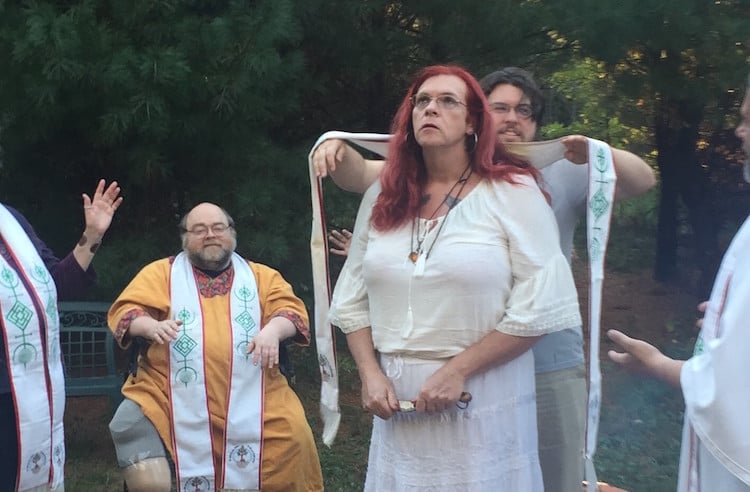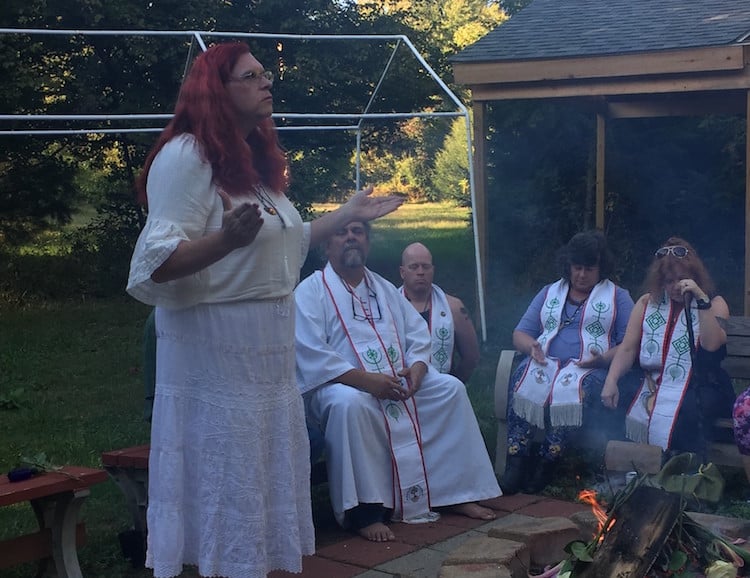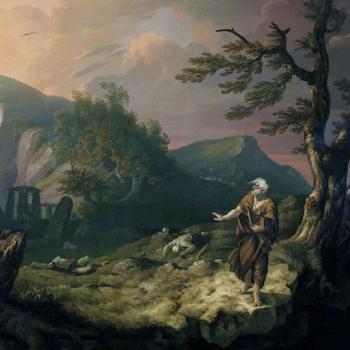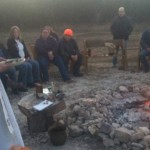Greetings everyone, it has been awhile since I have interviewed on Patheos. With Intersex Awareness Day on October 26th, I thought it was completely appropriate to interview one of my dear friends and fellow ADF priests. I wanted to gain a deeper understanding of the “I” in LBGQTIA, and I certainly gained that with this interview. I want to thank Rev. Ayliah Cannon for agreeing to be so open with me. I thoroughly learned a lot through this interview, and I hope that her insights can assist us as a community to be more inclusive. Blessings, Sean Harbaugh
Sean Harbaugh: Hi Ayliah, thank you for taking the time to talk. I really appreciate your willingness to do so, in order for others to hopefully have a deeper understanding of such a misunderstood topic. I would like to start off with giving a bit of background about yourself.
 Ayliah Cannon: At first, my background may not seem too unusual for a woman my age. I grew up in a small New England town, adopted by step parents with conservative values after their own children had left home. I was active in after school programs, earned mostly straight A’s and did babysitting on the weekends. Unable to afford college, I went into the navy and became a psychiatric technician and loved helping others. After a sexual assault left me with PTSD, I was discharged early and I invested all my military college funds into band instruments so I could pursue a singing and songwriting career. One of my greatest achievements was singing before a hundred people in a professional recital and receiving resounding applause.
Ayliah Cannon: At first, my background may not seem too unusual for a woman my age. I grew up in a small New England town, adopted by step parents with conservative values after their own children had left home. I was active in after school programs, earned mostly straight A’s and did babysitting on the weekends. Unable to afford college, I went into the navy and became a psychiatric technician and loved helping others. After a sexual assault left me with PTSD, I was discharged early and I invested all my military college funds into band instruments so I could pursue a singing and songwriting career. One of my greatest achievements was singing before a hundred people in a professional recital and receiving resounding applause.
After years of working in the medical and administrative fields, a few long term failed relationships, and various moves up and down the east coast, I reached my next greatest life achievement. I successfully completed the entire ADF Clergy Training Program, reaching the level of Senior Priest. I have been privileged in leading public rituals and teaching workshops for over twelve years. I am active in interfaith outreach and have led services in two different Unitarian Universalist Churches. I have been active in prison outreach, and volunteered in coastal clean-ups to protect manatees’ habitats. I have also pursued competitive interests in tennis, and currently in ballroom dancing. And I am intersex.
That’s a great deal of accomplishment. We’re hearing so much lately with people speaking out about sexual assault, and I appreciate the courage you have for speaking it here. It’s an issue within the pagan community as well. How did the revelations about Isaac Bonewits affect you? He is the founder of ADF, and you are a Senior Priest.
Having met Isaac Bonewits more than a few times, I didn’t feel the reported incident was congruent with his character, however, I believe no one human is beyond error. People generally don’t come with warning labels. Offenders come in all shapes and sizes. Just because someone is capable of accomplishing great deeds, does not mean they are not also capable of great misdeeds as well.
As a Senior Priest, in service to the community, I have a responsibility to give the victim my complete respect and support her in her healing and assist anyone else, regardless of gender, in recovering from traumatic incidents. The organization of ADF is more than person, and we are wonderfully diverse succeeding on the contributions of many members, not just Isaac.
You mentioned earlier that you are intersex. That is not a term that is mentioned very often. What does that mean?
“Intersex people are born with sex characteristics (including genitals, gonads or chromosome patterns) that do not fit typical binary notions of male and female bodies. Intersex is an umbrella term which describes a wide range of bodily variations. Sometimes these are visible at birth, others may appear at puberty, and some may not be physically apparent at all because they exist at the genetic level. Experts have discovered that intersex traits appear in 0.05 to 1.7% of the population, which makes them about as common as having red hair (about 1 – 2%).”
“Being intersex relates to biological sex characteristics and is distinct from sexual orientation. Intersex people may identify as straight, gay, bisexual, lesbian, asexual, and they may identify as male, female, both or neither.”
The above statements come directly from the United Nations Human Rights Commission.
Unfortunately, there is a mountain of misinformation on what and who intersex people are. Intersex is not part of the trans umbrella, (transgender or transsexual) nor is it a form of gender diversity. Intersex is about our bodies. Intersex, transgender and same sex attraction are distinct concepts and issues and may overlap. The LGBT and “I” communities may overlap, or an intersex person may identify as heterosexual and they may identify with the sex/gender they were assigned at birth.
There are approximately 35 sex characteristic variations which comprise intersex “conditions.” I was born with three. Like many infants born intersex, I was given gender-normalizing surgery and my birth certificate changed afterwards. Like other intersex people, I have been faced with many challenges which were overlooked by well-meaning, but misinformed physicians, psychologists and friends in our communities. These challenges cover a wide range of human rights as well as misunderstanding.
“Intersex people who cannot be easily determined to be either boys or girls are the very embodiment of this country’s transphobic and homophobic attitudes.” The Forgotten Vowel, Viloria, 2017.
Thank you for that explanation. Do you feel you are a part of the LBGQTI+ community, and if so (or not) how has that affected you?
As you know, words have power and therefore the language we choose can have a great influence. Acronyms are part of that language. Every time I see the acronym LGBT, I feel that being an “I” intersex has excluded me. Regardless of sexual orientation, everyone benefits from inclusionary language that challenges discrimination and promotes alliances.
For some intersex people, identifying with the trans or LGBT communities provides them a safe space and helps them feel like they belong somewhere. Since I identify as heterosexual, being part of the trans community helped a bit when I was younger but still felt like I was wearing another mask. As I came to embrace myself as intersex, I began to identify with the LGBTQIA+ community where my “I” is entirely welcome.
Have you ever received negative responses/reactions from the pagan community? And if so are those negative responses/reactions similar to what the transgender community have had to go through lately, particularly in women’s circles?
In the mainstream, I have experienced many forms of discrimination, however; in the pagan communities, the negative reactions I’ve gotten are more similar to subtle transphobia, such as being avoided or ignored. When I first started getting involved in the community, I tried to join various groups and was given a cold shoulder and talked down to.
If I was open about myself in emails, I would get responses suggesting I consider other groups. Many years ago, I was given a warning when I attempted to attend a Heathen function. I was stopped at the entrance and told “it would not end well.” I never asked what that meant. My current community in Florida, which is mostly Wiccan, and my extended community of ADF have always welcomed me, and I have attended both red tent activities and one women’s’ retreat and been warmly welcomed.
The topic of acceptance in the pagan community toward non-cis gendered individuals is big—especially out West where (as a prime example) Z. Budapest closed doors and excluded several from her Pantheacon ritual. How do you think we can bring better awareness and understanding to the community and how do we build acceptance instead of exclusion? How do we bring folks together instead of building more barriers?
Language is powerful. All parties involved have a responsibility to communicate clearly, openly and listen without bias. We must be mindful that people who have fought for their identities, such as feminist groups and non-cis gendered groups, have deep passion and conviction. This country has changed rapidly in the last decade compared to the last fifty or sixty years. Change is always going to be accepted differently, and those groups who have fought to protect their identity and their ideology are going to have a tougher time with it.
Expansion of compassion must be cultivated slowly, consistently and with patience. Leaders must be prepared to listen to the needs of all people and not make hasty judgment. In regards to the Pantheacon ritual, it might be helpful for organizers to re-evaluate their mission statement, and consider who, and what community needs, they are attempting to serve.
On a personal level, we can work on our own self-awareness. Ask yourself, what is at the root of this discomfort with people who live or look differently? Any change must begin within the individual. When we ask ourselves these difficult questions, we open ourselves to understanding and acceptance of others.
One more thing; language is powerful. This can’t be said often enough. Intersex people used to be referred to hermaphrodites. Not only is this inaccurate but it created stigma. Language is marginalizing. Your use of the term, “non-cis gendered” above may have been done for clarity, but every time we separate out one group of people from another, we marginalize them. This marks them as different, suggesting different social conventions, and ultimately a different perspective of understanding. Language can harm. Decades of well-meaning psychologists and medical doctors have taught what are called “born in the wrong body” theories.
Both trans and intersex people are encouraged to follow society’s binary rules. There may be some who are truly body dysphoric, but not all people are. These are the theories that have supported gender-normalizing surgery in infants and children, versus letting the child decide their gender – if they choose to have one at all. Every time we use words like disorder, syndrome, condition, or birth defect, we are suggesting there is something that needs fixing. For myself, I was not born in the wrong body. I just feel I was born with some extra challenges.
 Tell us about your vocation. What does it mean to be a priest?
Tell us about your vocation. What does it mean to be a priest?
Remember the line that if you ask a hundred pagans what they believe in and you will get 100 different answers? This is what it means to be priest in the pagan community. The following answer is my take on being a priest. On the surface, it means that an organization has placed their trust and faith in you to represent them on a large, public scale. It means that you have demonstrated a level of knowledge, skills, and ethics to be a leader, a helper and a guide for people on a spiritual journey, whatever that may look like to the individual. It also means sacrifice; it is a sacrifice of time and endless commitment. You will often have to put the needs of others before your own desires. But that also means you must be a master juggler, giving equal time to all in need, including yourself so that you avoid burnout.
On a deeper, more personal level, being a priest means becoming a voice for a segment of our community, or giving voice to a cause, such as those people marginalized by mainstream society. It means having conviction and doing the work to support your cause. The work you do may often be unseen and unacknowledged by the masses, but you do it because it is right and inherently sacred to you. Sometimes you must have more courage than the people you represent. Those people must see in you the strength and faith they are searching for. Being a priest, means being a symbol of hope, healing and a fulfilling connection to all the worlds, the spiritual, the mundane, and the world of nature that surrounds us.
How do you see paganism evolving? Do you see it becoming more mainstream or do you see it staying like it is–a mixture of private groups and public churches?
Several years ago, while teaching at a pagan festival in Michigan, I was asked this very same question. It was then that I coined the term “idiopaganism.” Based on the Greek form of idios, which means “private” or “one’s own.” I see pagan beliefs and practices becoming more individualized and hearth-centric. This means there may be a trend towards small groups. But this won’t stop there. Based on the recording of historical events, I believe the cycle we are experiencing will improve and I feel the current phase of reduced attendance at festivals, and gatherings will swing back.
Any form of actual evolution will require agents of change. These agents will appear in the form of leaders who understand the changing needs of the pagan community and find new ways of filling these needs, whether they be by applying technology differently, or by appealing to the different faces of community members. If leaders fail to adapt and expand what they offer, paganism cannot evolve. Treating LGBTQIA members as equals is just one element of that evolutionary process.
Does being an intersex person affect how you believe or practice your spirituality? Do you think other non-cis gendered people face similar challenges?
In ADF Druidry, we have a gatekeeper that moves between realms and can be said to stand astride worlds, thereby maintaining the portals which we send offerings through and receive blessings from entities. As an intersex person with both some female and some male parts, I identify directly with the gatekeeper. Like this entity, I stand astride two worlds, and though I choose not to, I could move back and forth between them, just as many gender-fluid people do in real life. When I discovered this aspect of ADF Druidry, it made me feel like I was home.
Before I discovered ADF, and even shortly thereafter, I was hesitant to use the word “intersex”. As a person with PTSD and survivor of multiple sexual traumas, there is a psychological need to avoid any confrontation, as well as a need to please everyone. If someone assumed I was trans or something else, I just went along with it. I did anything to avoid controversy and reveal personal details. I had tried to be honest early in my pagan community experience. I don’t like being excluded or isolated.
As a priest, one of my favorite activities is to lead rituals. Whenever I would host a ritual, there would be many who came out to support me, but there were always a few who wouldn’t speak to me, who frowned at me throughout the ritual, and refer to me with incorrect pronouns as they departed. As a leader, I would always try to deflect their negative energy, but inside where no one was looking, it hurt. Even though I have earned the respect of several, I often feel treated differently. I have become a master of appearing unaffected by people’s misguided words. When celebrants gather for pot luck, I am often without peers to sit with. I have adopted the habit of using the potluck time to clean and pack my ritual gear, and meditate. That way I don’t have to sit alone.
Whether you call it transphobia or homophobia, or some other kind of phobia, it still produces the same feelings of unwelcomeness. Bullying also exists. The silent treatment is real. Lack of inclusion is one of the biggest challenges facing LGBTQIA pagans. Within that umbrella, trans people are not always welcome with gay and lesbian people, and intersex people are often excluded by everyone else, which puts pressure on individuals to identify as something they are not. Just like I did to fit in. Lack of inclusion means many who might be valuable contributors to a community are forced into a solitary practice. Lack of inclusion also means that resources, study materials or mentors may not be readily available, thus limiting peoples’ potential for a spiritual life.
Ayliah, I want to thank you for taking time for this interview. I appreciate your openness, as it is an important discussion as Intersex Awareness Day approaches next Friday. Before we wrap up, is there anything you’d like to add?
Some readers may be wondering why I chose to share so much in this forum. Over the last few years alone, I have seen big increases in support for transgendered people. Efforts by LGBT allies have brought about greater awareness and acceptance. As LGBT visibility has increased, it has become increasingly safer to be open about being and feeling different. But there is still a long road ahead. Laws regarding discrimination, transgender people in the military, and bathroom bills have become commonplace in the news. With many political issues becoming colored and confusing, there is a need for authenticity.
Reclaiming my identity as an intersex woman is a part of my spiritual journey. As part of my own journey to healing, I have chosen to be authentic in my self-representation, and hopefully my story will assist others in doing the same. With this article, I hope to bring greater visibility to intersex people and clearer understanding of how our challenges may be similar to the challenges of the LGBT community, but we face much different circumstances.
We are not automatically part of the LGBT umbrella until it becomes LGBTQIA. Drawing on inspiration from Mx. Anunnaki Ray Marquez, an intersex activist and educator, I have created a list of signs that you or someone you know might have intersexphobia. The most obvious signs of bullying, derogatory language, avoidance, denial and even violence are only the beginning. Other signs of intersexphobia include:
• The belief that an infant who is born intersex needs to be fixed to fit in or be happy.
• The belief that intersex people have a disorder, syndrome, condition that requires medical intervention.
• The belief that an intersex person is confused about their identity and has a mental illness.
• The belief that gender is determined by genitalia, hormones or chromosomes when it actually more about the internal experience and inner awareness. An intersex person may have any gender, more than one gender, or no gender at all.
• The belief that we are not lovable, and worthy of equal treatment unless we conform to typical, mainstream attitudes of what men and women look like and how they conduct themselves.
• The belief that if we are mis-gendered at birth, then reclaiming our true gender later on makes us transgendered. This varies with the individual and only some intersex people identify as transgendered.
• The belief that intersex people are trying to deceive you when they reveal their true gender identity. I once had a friend who refused to believe I wasn’t trans. He called me a liar and ended our friendship. I miss him.
• The belief that we are a danger in public restrooms or locker rooms and should be forced to use restrooms which do not reflect our true gender identity, that as students we need to be segregated in gym class, and forced to use separate facilities for changing gym clothes.
• The belief that intersex athletes with a higher level of testosterone have an unfair advantage and need to be punished.














